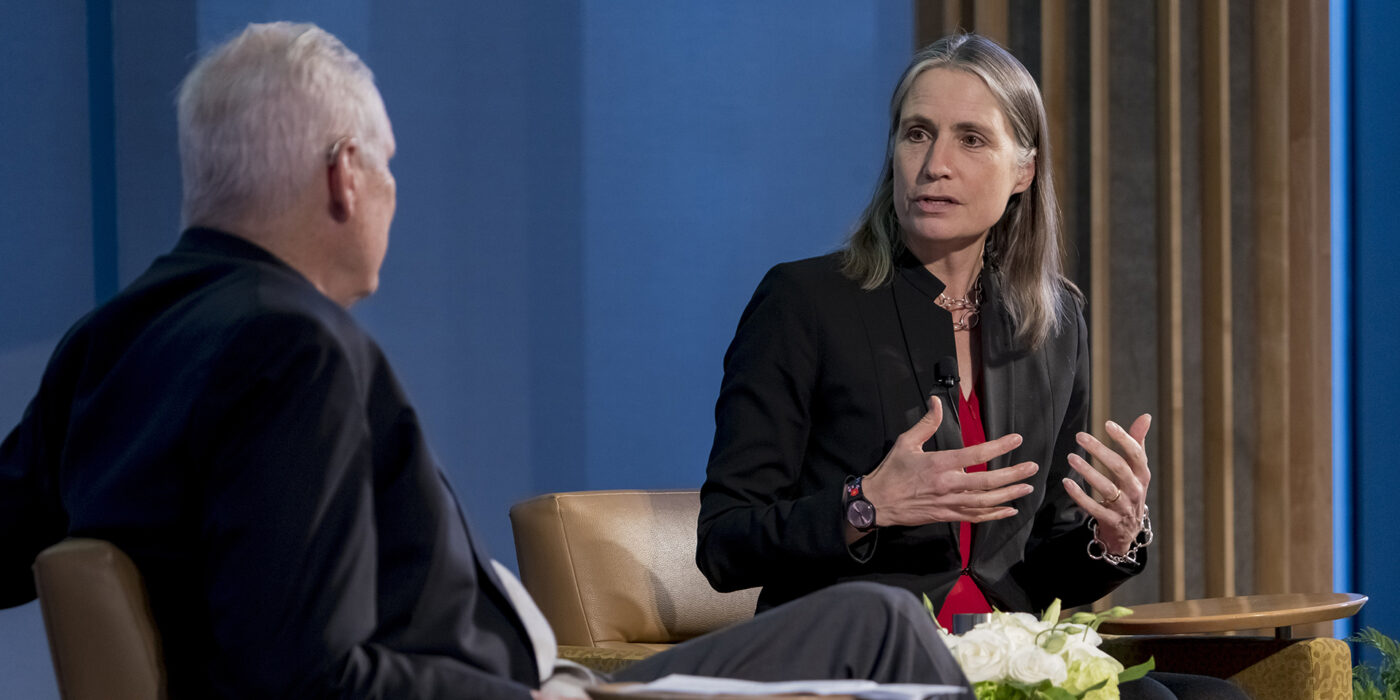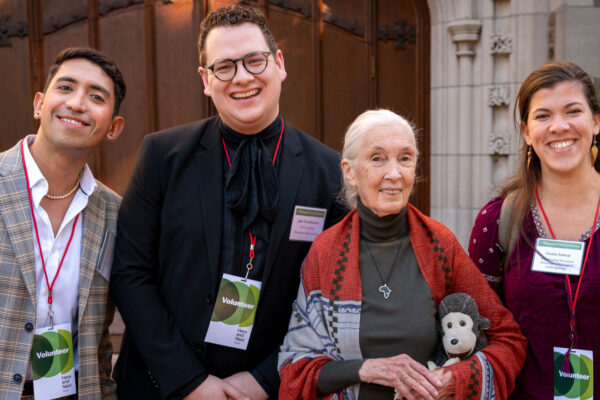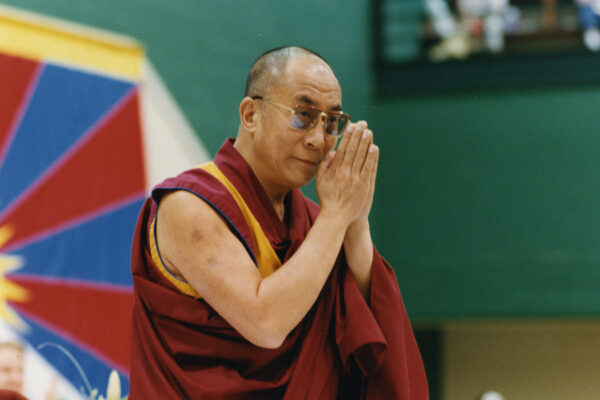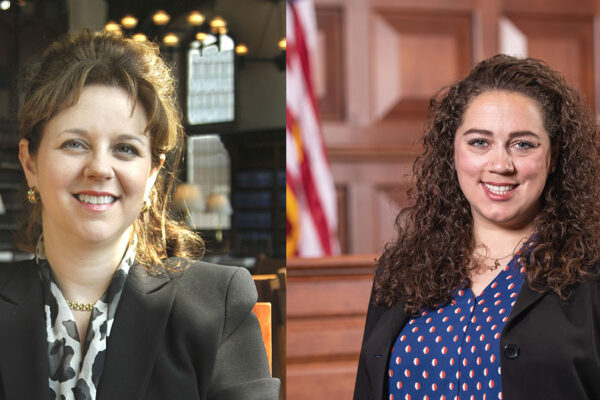Russia is America’s “Ghost of Christmas Future.”
With those words, an alarmed murmur rippled through the crowd at the Assembly Series fireside chat with Fiona Hill, an expert on Russia who rose to global prominence after her candid 2019 Congressional testimony in the first impeachment inquiry of former President Donald Trump.
Hill warned a capacity audience that the United States could be headed down the same authoritarian path as Russia because a lack of opportunity in the post-industrial era has left people angry and susceptible to Putin-like populist messages that exploit fissures in our society.
“Think about all of our experiences in the last several years of the country pulling itself apart on a partisan level, and the partisan myths and the stories we tell ourselves about ‘the other,’” said Hill, a senior fellow at the Brookings Institution, a nonprofit public policy organization based in Washington, D.C. “That’s what I mean when I say Russia is the Ghost of Christmas Future for the United States. Now remember, of course, in the Dickens story, the worst doesn’t come to pass [because the warning is heeded].”
“It’s much easier to exert social control and manipulate and push disinformation on people who are not educated.”
Fiona Hill
During the talk*, “The World Putin Wants: The Invasion of Ukraine and the Threat to the International Order,” Hill and James Wertsch, the David R. Francis Distinguished Professor who is also an expert on Russia, discussed Russia’s invasion of Ukraine and the danger of false populist narratives. Hill said Putin wants the world to believe his version of history. In his rise to power, she said, Putin bent historical national narratives to serve his purposes while exploiting the fears of Russians who felt forgotten after the collapse of the Soviet Union.
Now, Hill said, Putin uses disinformation and division to justify his invasion of Ukraine. Putin and populists around the world very artfully play people against each other, Hill said, but the keys to avoiding Russia’s bleak fate are education and opportunity.
“It’s much easier to exert social control and manipulate and push disinformation on people who are not educated,” Hill said.
Saving democracy
In Hill’s book There is Nothing for You Here: Finding Opportunity in the 21st Century, she uses her own life story to examine ways to avoid this crisis for democracy. As she recounts her rise from an English coal miner’s daughter to White House adviser, she highlights how chance encounters, mentors, scholarships, grants, campus jobs and other timely interventions helped her overcome the obstacles of geography, gender and class to attend the University of St. Andrews in Scotland and earn her master’s and doctoral degrees at Harvard University. Opportunities like the ones she managed to scrape together must be more accessible to all, she says, if the U.S. is to avoid the consequences of angry, forgotten people willing to trade democracy for the empty promises of populists.
While growing up in North East England, Hill saw firsthand how mine closures crashed the local economy and how the lack of opportunity crushed her community. While studying in Russia after the fall of the Soviet Union, she saw parallels between her home county and rural Russian and declining industrial regions where opportunity had dried up. After moving to the United States to attend Harvard in 1989, Hill saw the same gap in opportunity grow around this country as factories moved abroad and mills and mines closed.
Hill, now a U.S. citizen, says the U.S. needs to bridge the opportunity gap with education, whether through apprenticeships, job training, higher education or other resources. That’s why she thinks it’s important to bring her message to places of opportunity and education like Washington University. “It’s here in an educational institution — it could be high schools as well, or community colleges, vocational schools — where people get the tools and the skills they need to move forward,” Hill says.
Hill believes everyone can play a role in helping provide opportunity.
“We can change things for other individuals and actually sometimes entire groups of individuals by being engaged,” she says. “If you’re in college, you can do it at a peer-to-peer level or you can advise somebody in high school. You can be a Big Brother or Big Sister. You can be a mentor.
“If you’re further up the food chain — a college administrator or CEO of a company — start to think about how you can broaden access for people,” she says. “Avoid just hiring from the Ivy League and go to schools where people have to work to put themselves through college. Look at the kind of adversities that people have had to overcome.”
“We can change things for other individuals and actually sometimes entire groups of individuals by being engaged.”
Fiona Hill
While on campus, Hill spoke with a class titled “Hot Peace: U.S.-Russia Relations Since the Cold War.” And she spoke with members of the McDonnell International Scholars Academy and students in the Career Center’s Government and Public Policy Work Group.
Hill says she told students her own story of overcoming adversity and told them to “dig deep into themselves and chart their own path. I want them to understand that they can be the masters of their own destiny.”
Caroline Kaplan, a sophomore studying international affairs, met Hill at a breakfast for the Government and Public Policy Work Group. “She encouraged us to take advantage of opportunities and adventures when they present themselves,” Kaplan says. “You never know who you’ll meet or where such adventures can take you in your career.”
A Brown School doctoral student discussed his background as an Iraqi refugee with Hill. “Her speech truly gave me the motivation to push forward and to not give up,” says Mustafa Rfat, a McDonnell Academy scholar.
During Hill’s visit to the “Hot Peace” class, teaching professor Krister Knapp was impressed with “how in-depth Hill could speak about these issues, going into unbelievable detail that only a top-level expert with experience in government could know.”
“I think she mesmerized some of the students,” Knapp says.
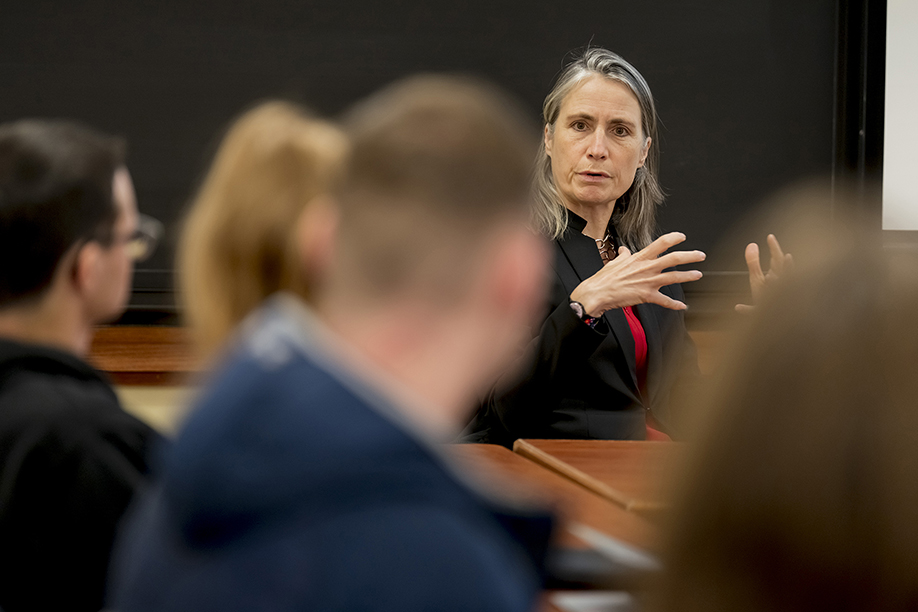
Overcoming the odds
In her book, Hill credits her success to luck, hard work and lots of help. She advocates for expanding opportunity and education because access to both lifted her out of poverty.
Her grandfather was a miner, and her father considered himself a miner throughout his life, even though his mining job had disappeared by the time she was born. Both of her parents had grown up or lived in rented workers’ housing or public housing. Her hometown of Bishop Auckland had lost its foundries, factories, mines and most other businesses. Her parents both worked at one of the only employers left, a National Health Service (government-run) hospital, where her mother was a nurse and her father was an orderly. When her mother stayed home to take care of Hill and her sister, the family barely scraped by.
Hill was a bright student, but that wasn’t enough to escape the area’s poverty. No one in her immediate family had gone to university. For most in her town, higher education was out of reach — places were limited, and the local schools had few college-prep resources.
“I got the idea that I could go to an elite college not really from my parents — who couldn’t conceive of it — but from my local member of parliament visiting my school,” she says.
At age 11, she was offered a place at a good private school after passing a selective exam. However, even though the school waived its fees, she couldn’t attend because her family couldn’t afford uniforms, books, bus fares and extras like school trips.
Later in high school and college, she took advantage of all the small grants, scholarships, internships, odd jobs and exchange programs she could find — mostly through extended family, neighbors or other local connections, and sometimes sheer luck.
One such opportunity has a link to the currently embattled Donbas region of Ukraine: The miners in her part of North East England had been “twinned” with the miners of Donbas since the 1920s through a series of miners delegation visits and exchanges. During the U.K. miners’ strike in the 1980s, miners from around the world sent money to miners’ associations in the U.K. Because her father had been a miner, money from Donbas miners was available for her to use for an intensive Russian-language course, which started her on her way to studying Russia.
Despite her high school’s subpar courses for the all-important university entrance exams, she was able to get the results she needed to attend the University of St. Andrews in Scotland, where she studied Russian and modern history. While on a study-abroad year in Russia in 1987–88, she took a job translating and doing on-site tasks for NBC News during President Ronald Reagan’s summit with Soviet President Mikhail Gorbachev. As she was making coffee for Maria Shriver, she met a visiting Columbia University professor who was in Moscow as a network adviser. As they chatted, he suggested she apply for graduate scholarships in the United States. She’d been unaware such opportunities existed, but she took his advice and applied for scholarships to Harvard and other universities.
Even with grants and scholarships, money was still a barrier. While she was a Harvard graduate student, one of the only women faculty members bought her a suit, because Hill, dressed in Doc Martens and ripped jeans, couldn’t afford the professional attire she needed to be taken seriously in meetings.
She also had to overcome class prejudice. In the U.K., her working-class accent was rarely heard in academic or political circles. She was often dismissed and underestimated because her accent branded her as working class from the North East, a forgotten and overlooked region.
“People like me have an obligation and duty to pay back as well as pay forward, because so many people helped me in my career.”
Fiona Hill
Being a woman was another obstacle. Early in her career, she was often the only woman in the room. Through subtle and not-so-subtle sexism, she persevered to become one of the top analysts in her field.
Now, looking back on her successful foreign policy career and the help she had along the way, she wants to give back. “I’m trying to develop platforms to talk about increasing access to education,” she says. Hill recently was appointed chancellor of Durham University in her home region in England. “It’s a ceremonial role, but it gives me another platform to talk about education and opportunity.
“People like me have an obligation and duty to pay back as well as pay forward, because so many people helped me in my career,” she says.
Pushing back against Putin’s narrative
A lack of opportunity and education can give populists like Putin a receptive audience for his distorted historical national narratives. “Putin knows that he who controls the past can also control the present and shape the future,” Hill said during the Assembly Series conversation with Wertsch.
For example, Putin’s version of history states that Ukraine was and still is part of Russia. But Hill argues, “Most European countries fall into the same category as Ukraine, in that they’ve gotten independence at different points, from different empires, and their borders have changed. But after World War II, we said no more forcible changes of borders. So, what Putin’s trying to do is spin all these other stories to gloss over the fact that he’s broken the rules.
“We can push back against the things that we see that are wrong or erroneous. Sometimes you must stand up and do something. And this is one of those times whether we like it or not.”
Fiona Hill
“His manipulations have proven to be very dangerous because now he’s invaded Ukraine and turned Europe, and in fact the world, on its head,” she said in her talk.
In another distortion, Hill said, Putin equates Russia’s long history of beating back invading forces (Swedes, Ottomans, Poles, Napoleon, Nazis, etc.) with Russia reclaiming Ukraine from the West.
“We have to push back on these narratives,” Hill told the audience. “This isn’t a battle for the future of Russia or for Russia’s survival. Putin is trying to say that it is. This is a war of aggression, and Russia is the invader.”
Hill ended her talk by saying that everyone has a role to play in fighting false narratives, even in a conflict on the other side of the world. “One thing I want you to take away is that we all have agency,” she said. “We can push back against the things that we see that are wrong or erroneous. Sometimes you must stand up and do something. And this is one of those times whether we like it or not.”
—————————————————————————————————————————–
*The event was part of the Assembly Series and presented by “Here and Next,” the university’s strategic plan. It was made possible by the Office of the Provost, in partnership with the McDonnell International Scholars Academy, the S.T. Lee Endowed Lecture and the Thomas C. Hennings, Jr. Memorial Lecture Fund.
